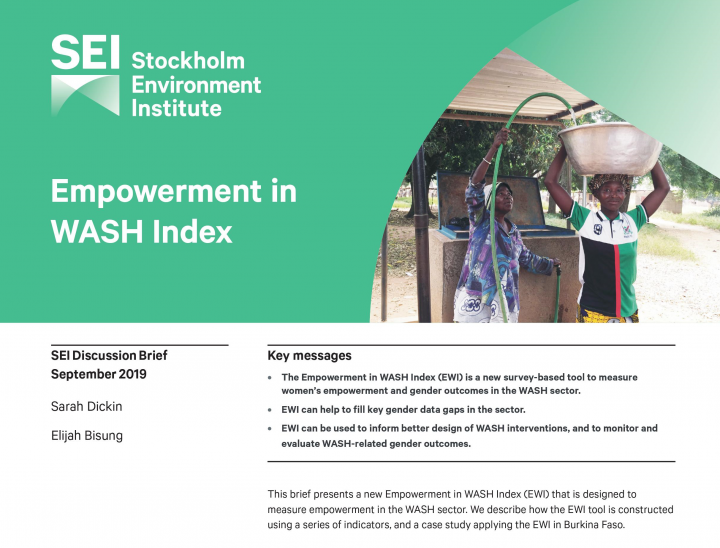Empowerment in WASH Index Dickin, S., Bisung, E. (2019)
This brief presents a new Empowerment in WASH Index (EWI) that is designed to measure empowerment in the WASH sector. We describe how the EWI tool is constructed using a series of indicators, and a case study applying the EWI in Burkina Faso.
The EWI measures agency, participation and empowerment in the water and sanitation sector. The Index is made up of indicators to assess empowerment in relation to WASH roles and responsibilities as well as broader society. Data on each indicator is collected using a survey that targets both male and female decision-makers in households. The indicators address empowerment at individual, household and community levels.
Although safe water and sanitation are widely believed to be critical for women’s empowerment and gender equality, there have been limited efforts to measure empowerment in the WASH sector. But because the EWI can collect this information, it can support assessments to capture both positive or negative gender outcomes of interventions, and help identify the pathways through which interventions and services can increase empowerment. This means that greater progress can be made towards universal access to WASH services and reducing related gender disparities.
The Empowerment in WASH Index provides a new approach to measure and monitor empowerment and WASH-related gender outcomes. Next steps for developing the EWI will include cross-cultural comparisons and validation of the tool, as well conducting intersectional analysis to provide information on how women’s empowerment in WASH intersects with other social factors such as age and ethnicity.
Bibliographic information
Dickin, S., Bisung, E. (2019). Empowerment in WASH Index Stockholm Environment Institute
Filter / Tags
Factsheets and policy briefsEnglishWomen's rights & representation and empowermentGender equalityGender transformative WASH
External links
Downloads

Published in: 2019
Pages: 4
Publisher:
Stockholm Environment Institute
Author(s):
Dickin, S., Bisung, E.
Uploaded by:
SEI
Stockholm Environment Institute
Location of library entry:
